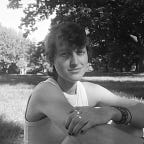Reflections on a small town: How moving away helped me see the merit
In a lot of ways, I’ve spent life living in the future: dreaming about my next move, my next adventure, my next epiphany. For me, college has been a space for me to be malleable, shifting from one experience to the next—transitioning from city to city, apartment to apartment, and major to major. I’ve discovered pieces of myself where I least expected them, whether I was living in Montreal, Arizona, or Boston. I have realized that the process teaches as much as I wish to learn.
I always hoped I’d get here someday, self-actualizing and surrounded by people who would help me learn things about myself, about the world I lived in, about how to make change. Before college, I was a kid with ideas bigger than the body I occupied, feeling trapped in a small school in a small town. I imagined that only by going out into the world could I pursue those questions, find those answers.
So I went to college in Montreal and then in Boston—what I considered to be the “big city”—to start that search. I loved the anonymity and the chance to truly create myself. I found university-sponsored programs and initiatives with resources to back the big ideas that students had. I wrote articles about community leaders and elected officials in Boston and the changes they were making. I could not believe how much there was to experience. I felt like a sponge, soaking it all in. I would never have described myself as a “city person,” but I wasn’t sure how not to live in a city after the connective college experience.
Then, 2020.
When COVID-19 hit, my hometown scrambled to prepare—weeks after bigger cities had enacted preliminary plans. I held my breath, waiting to see if the members of my small, semi-Southern town would protest masks.
But then I watched people in Fredericksburg help to find housing for those experiencing homelessness to protect them from the virus. I saw local schools organizing to provide free, safe daycare for children of hospital workers after school went remote for the year. I saw people sitting on their porches and striking up conversations with people walking by in a way I haven’t seen in years. I saw resounding support for masks as people emphasized the need to look out for others in the community.
I realized that maybe there’s something special about a tight-knit town, something special about everyone knowing everyone else.
Hundreds of people showed up to protest after the murder of George Floyd. There was pushback at first—we faced the National Guard and became the smallest city in the United States in which protestors were tear gassed. Change was slow going — there were protests every day for months — but I think eventually the mayor realized what we were fighting for would ultimately make the city better, stronger. The pressure mattered. Expectations changed. And the process taught us that involvement does make a difference, that our voices can shape opinions and accelerate change.
That’s the thing about small towns: They aren’t large enough to look the other way. Fredericksburg doesn’t have the extra room for ambivalence. If there’s a protest downtown, the whole town can hear it. If there’s a pervasive conversation among citizens, you can’t shy away from it. Everyone is involved in one way or another.
Fredericksburg is old, but it is not resistant to change. I think that’s what really stands out about it, above all else. Yes, we have Carl’s ice cream, extensive Revolutionary and Civil War history, rivers, and a quaint downtown area. But Fredericksburg has a lot more soul than that.
It hit me this year that it’s by its own nature of being a small town that Fredericksburg is able to be as malleable and flexible as it is, pivoting to meet the needs of those who are most targeted or most at risk. The close community holds people accountable. The scale of the town means that it’s easy to get involved; easy to apply pressure to the cause you’re passionate about. Folks in Fredericksburg are agile by nature of one overarching, common theme—loyalty to the town and those in it.
When I take a step back and think about my experience in Boston, it’s a little different. Yes, movements gain a bigger volume of traction; yes, the voting population is larger. But at some level, larger cities are bound by rigid rules, deeper politics, and greater national visibility. 20 percent of Boston’s population is comprised of college students, who can’t vote and who may not be invested in the longevity of the city they’re studying in. In a smaller town, those who are involved are deeply invested.
When you have that kind of involvement and community agility, problem-solving isn’t such a problem. The roadblocks in processes don’t fully stop progress. At the core of it, Fredericksburg is a really interesting model for how small-town dynamics and core beliefs can enable meaningful impact and inspire similar change in larger cities later on.
It’s important to note that this experience doesn’t dissuade me from being involved in Boston. I learned this year that local action and local change truly are an effective way to create a ripple effect, wherever that community is. It took me moving away to see it clearly, but now that I can — I’m proud to see Fredericksburg as an example of how to lead justice and sustainable change.
